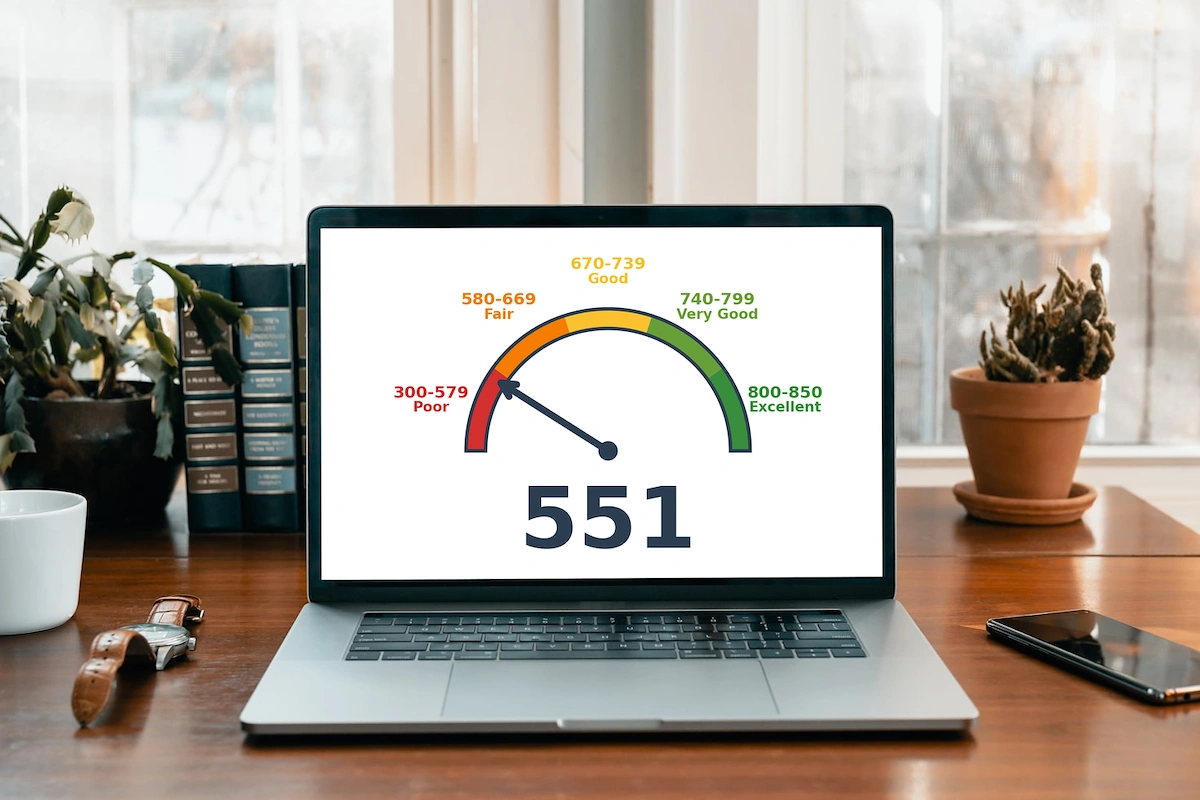
Kudos has partnered with CardRatings and Red Ventures for our coverage of credit card products. Kudos, CardRatings, and Red Ventures may receive a commission from card issuers. Kudos may receive commission from card issuers. Some of the card offers that appear on Kudos are from advertisers and may impact how and where card products appear on the site. Kudos tries to include as many card companies and offers as we are aware of, including offers from issuers that don't pay us, but we may not cover all card companies or all available card offers. You don't have to use our links, but we're grateful when you do!
551 Credit score: What You Need to Know in 2025
July 1, 2025


TL;DR
A 551 credit score is considered to be in the "Poor" range, but it's best viewed as a foundational step toward building a stronger credit history. This score provides a clear opportunity for growth and access to more favorable financial options in the future.
What Does a 551 Credit Score Mean?
A credit score of 551 lands squarely in the "poor" range on the FICO scale, which spans from 300 to 850. Lenders generally view scores under 580 as subprime, signaling a higher risk. This number reflects your past credit management and suggests to financial institutions that you may have had trouble meeting financial obligations in the past.
This score can create significant financial hurdles. You'll likely face rejections for loans or be offered steep interest rates if approved, making big-ticket items like a car or home much more expensive. While a 551 score presents immediate challenges, it's not a permanent label. Your credit standing is dynamic and can be rebuilt over time.
Who Has a 551 Credit Score?
While age isn't a direct factor in credit score calculations, there is a clear trend of scores improving over time. According to 2023 data from Experian, the average FICO scores for different generations break down as follows:
- Generation Z (ages 18-26): 680
- Millennials (ages 27-42): 690
- Generation X (ages 43-58): 709
- Baby Boomers (ages 59-77): 745
- Silent Generation (ages 78+): 760
Credit Cards With a 551 Credit Score
A credit score of 551 falls into the "poor" credit range, which can significantly limit your options when applying for a new credit card. Most lenders view this score as an indicator of high risk, making them hesitant to extend unsecured credit. Consequently, you may find yourself primarily eligible for secured credit cards that require a cash deposit or unsecured cards with high annual fees and interest rates.
To navigate these options, Kudos offers AI-powered tools that personalize recommendations based on your financial goals and preferences. Features like the Dream Wallet analyze your actual spending to find the best match, providing insights on how a new card could impact your credit score.
Auto Loans and a 551 Credit Score
A 551 credit score places you in the subprime lending category, which means you'll likely face significantly higher interest rates on an auto loan. Lenders consider this score a greater risk, so while approval is possible, the loan terms will be less favorable than for those with higher scores.
According to an automotive finance market report, average interest rates vary significantly across credit score brackets:
- Super-prime (781-850): 5.25% for new cars and 7.13% for used cars
- Prime (661-780): 6.87% for new cars and 9.36% for used cars
- Non-prime (601-660): 9.83% for new cars and 13.92% for used cars
- Subprime (501-600): 13.18% for new cars and 18.86% for used cars
- Deep subprime (300-500): 15.77% for new cars and 21.55% for used cars
Mortgages at a 551 Credit Score
With a 551 credit score, your primary mortgage option is an FHA loan. While conventional and jumbo loans are unavailable at this credit level, an FHA-insured loan allows for scores as low as 500. However, to qualify with a score between 500 and 579, you must provide a down payment of at least 10%.
A 551 score will also lead to less favorable loan terms. You can expect significantly higher interest rates, which substantially increases the long-term cost of your home. Lenders will also apply stricter underwriting standards, scrutinizing your financial history more closely and potentially capping the loan amount.
What's in a Credit Score?
Figuring out what goes into your credit score can feel like trying to solve a complex puzzle, but it generally boils down to a handful of key elements. The most common factors include:
- Your history of making payments on time is the most significant factor.
- How much of your available credit you're currently using, known as your credit utilization ratio, plays a major role.
- The age of your credit accounts, including the average age and the age of your oldest account, is also considered.
- Lenders like to see that you can responsibly manage different types of credit, such as credit cards and loans.
- Opening several new credit accounts in a short period can be seen as a risk and may temporarily lower your score.
How to Improve Your 551 Credit Score
No matter your current credit score, it's always possible to improve your financial health through consistent and positive habits. By taking the right steps, you can see meaningful changes to your score in as little as three to six months.
- Establish automatic bill payments. This ensures you never miss a due date, which is critical since payment history is the most significant factor in your FICO® score. Making consistent, on-time payments is a foundational step to prevent your 551 score from dropping further.
- Reduce your credit utilization ratio. Aim to use less than 30% of your available credit, as this is the second most important element of your score. Paying down balances demonstrates responsible credit management to lenders, which is essential for rebuilding your credit.
- Monitor your credit reports. Regularly checking your reports from Experian, TransUnion, and Equifax helps you find and dispute inaccuracies that could be unfairly hurting your score. Removing errors is one of the quickest ways to potentially boost your credit.
- Apply for a secured credit card. These cards require a cash deposit as collateral, making them accessible for those with damaged credit. Using a secured card responsibly allows you to build a positive payment history and demonstrate creditworthiness over time.
As you work on improving your credit, a tool like the Kudos browser extension can help you make smarter decisions and maximize rewards.

Supercharge Your Credit Cards
Experience smarter spending with Kudos and unlock more from your credit cards. Earn $20.00 when you sign up for Kudos with "GET20" and make an eligible Kudos Boost purchase.
Editorial Disclosure: Opinions expressed here are those of Kudos alone, not those of any bank, credit card issuer, hotel, airline, or other entity. This content has not been reviewed, approved or otherwise endorsed by any of the entities included within the post.




























.webp)
.webp)
.webp)
.webp)
.webp)
%20(1).webp)
.webp)


.webp)